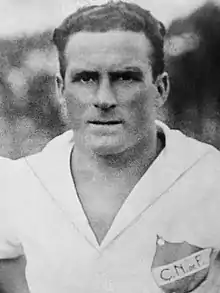 Scarone with Nacional | ||||||||||||||||||||||||||||||||||||||||||||||||||
| Personal information | ||||||||||||||||||||||||||||||||||||||||||||||||||
|---|---|---|---|---|---|---|---|---|---|---|---|---|---|---|---|---|---|---|---|---|---|---|---|---|---|---|---|---|---|---|---|---|---|---|---|---|---|---|---|---|---|---|---|---|---|---|---|---|---|---|
| Full name | Héctor Pedro Scarone Berreta[1] | |||||||||||||||||||||||||||||||||||||||||||||||||
| Date of birth | 26 November 1898 | |||||||||||||||||||||||||||||||||||||||||||||||||
| Place of birth | Montevideo, Uruguay | |||||||||||||||||||||||||||||||||||||||||||||||||
| Date of death | 4 April 1967 (aged 68) | |||||||||||||||||||||||||||||||||||||||||||||||||
| Place of death | Montevideo, Uruguay | |||||||||||||||||||||||||||||||||||||||||||||||||
| Height | 1.69 m (5 ft 7 in) | |||||||||||||||||||||||||||||||||||||||||||||||||
| Position(s) | Inside forward | |||||||||||||||||||||||||||||||||||||||||||||||||
| Senior career* | ||||||||||||||||||||||||||||||||||||||||||||||||||
| Years | Team | Apps | (Gls) | |||||||||||||||||||||||||||||||||||||||||||||||
| 1917–1926 | Nacional | 115 | (108) | |||||||||||||||||||||||||||||||||||||||||||||||
| 1926–1927 | Barcelona | 18 | (17) | |||||||||||||||||||||||||||||||||||||||||||||||
| 1927–1931 | Nacional | 45 | (39) | |||||||||||||||||||||||||||||||||||||||||||||||
| 1931–1932 | Inter | 14 | (7) | |||||||||||||||||||||||||||||||||||||||||||||||
| 1932–1934 | Palermo | 54 | (13) | |||||||||||||||||||||||||||||||||||||||||||||||
| 1934–1939 | Nacional | 31 | (16) | |||||||||||||||||||||||||||||||||||||||||||||||
| Total | 277 | (200) | ||||||||||||||||||||||||||||||||||||||||||||||||
| International career | ||||||||||||||||||||||||||||||||||||||||||||||||||
| 1917–1930 | Uruguay | 51 | (31) | |||||||||||||||||||||||||||||||||||||||||||||||
| Managerial career | ||||||||||||||||||||||||||||||||||||||||||||||||||
| 1947–1948 | Millonarios | |||||||||||||||||||||||||||||||||||||||||||||||||
| 1951–1952 | Real Madrid | |||||||||||||||||||||||||||||||||||||||||||||||||
| 1954 | Nacional | |||||||||||||||||||||||||||||||||||||||||||||||||
Medal record
| ||||||||||||||||||||||||||||||||||||||||||||||||||
| *Club domestic league appearances and goals | ||||||||||||||||||||||||||||||||||||||||||||||||||
Héctor Pedro Scarone Berreta (26 November 1898 – 4 April 1967) was a Uruguayan footballer who played as inside forward. Known as "the Gardel of Football"[2][3] and El Mago ("the Magician") due to his extraordinary skills with the ball,[4][5] Scarone was considered one of the best players in the world during his time.[6] He was crowned world champion three times, after winning the editions of the 1924 and 1928 Olympic football tournaments, along with the first World Cup in 1930.[7]
At club level, Scarone spent most of his career with Nacional, with which he won 21 official titles. He scored a total of 301 goals for the club in 369 appearances. Scarone holds the record of years played for Nacional, having spent 20 years with the club. He is also the 3rd. all-time Uruguayan Primera División with 163 goals, and the 2nd. all-time top scorer of Nacional (behind Atilio García) with 301 goals.[4]
With a height of 170 cm and thin legs, Scarone was rejected by Nacional at the age of 15. He returned one year later, being accepted by the club but sent to the reserve team. Nevertheless, Scarone would be promoted to the senior squad after playing only five matches in the reserve team.[5]
Apart from Nacional, Scarone also played for Spanish side Barcelona, and Italian clubs Inter Milan and Palermo. He was the younger brother of another legend of Nacional, Carlos Scarone.[4]
International career
With the Uruguay national team, Scarone won the South American Championship four times: in 1917, 1923, 1924, and 1926, and the Olympic gold medal twice:[8] in 1924 and 1928 recognized as FIFA World Cup.[9][10]
At the age of 19, he scored the goal that gave Uruguay the title at the 1917 South American Championship, in the final against Argentina, his fourth international match.
Scarone finished his international career by leading Uruguay to the 1930 FIFA World Cup, and although his international career ended that same year, the 31 goals in 52 matches (actually 52, but 21 goals were in unofficial matches) he scored for his country stood until as of 2011 as the national record. With his goal against Romania on 21 July 1930 Scarone was the last player born in the 19th century to score in a World cup final tournament.
Managerial career and later life
After retiring as a player, Scarone became a football coach. He was the second manager of Millonarios since its origins, from 1947 to 1948, while the club was still an amateur team. He was manager of Nacional and Real Madrid in the 1950s. He died in 1967 in Montevideo, aged 68, after attending a match of Nacional.[4]
We were young, winners, united... we believed we were indestructible.[5]
— José Nasazzi at Scarone's funeral
International goals
Uruguay's goal tally first
Titles
- Nacional
- Primera División (8): 1916, 1917, 1919, 1920, 1922, 1923, 1924, 1934
- Copa Honor (2): 1916, 1917
- Copa Competencia (3): 1919, 1921, 1923
- Copa Albion (1): 1919
- Copa León Peyrou (1): 1920
- Torneo Competencia (1): 1934
- Copa de Honor Cousenier (2): 1916, 1917
- Copa Aldao (3): 1916, 1919, 1920
- Barcelona
- Copa del Rey (1): 1926
- Uruguay national team
- Copa América (4): 1917, 1923, 1924, 1926
- Olympic Games (2): 1924, 1928
- FIFA World Cup (1): 1930
Individual
- IFFHS Uruguayan Men's Dream Team[11]
References
- ↑ "Scarone, Héctor".
- ↑ "Celebrating king of tango Carlos Gardel, 80 years on from his death". Retrieved 17 April 2023.
- ↑ "Hector Scarone, the uruguayan wizard". Retrieved 16 April 2023.
- 1 2 3 4 Era un mago, genio, goleador, divo: la trayectoria de Héctor Scarone by Luis Prats, 23 April 2017. El País
- 1 2 3 Héctor Scarone, el 'mago' charrúa by Jaime Rincón on As, 17 April 2014
- ↑ "HECTOR SCARONE, THE URUGUAYAN WIZARD". INTER Official Site. 7 June 2017. Archived from the original on 6 July 2019. Retrieved 13 June 2018.
- ↑ "La AUF cumple 120 años". Retrieved 16 April 2023.
- ↑ "Héctor Scarone". Olympedia. Retrieved 18 August 2021.
- ↑ "InfoPlus" (PDF) (in Spanish). FIFA. Archived from the original (PDF) on 14 July 2015. Retrieved 13 June 2018.
- ↑ Morenilla, Juan (5 June 2016). "Uruguay: dos Mundiales, cuatro estrellas". El País (in Spanish). Retrieved 13 June 2018.
- ↑ "IFFHS All-Time Uruguay Men's Dream Team". IFFHS. 5 August 2021. Retrieved 9 January 2023.